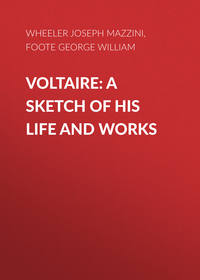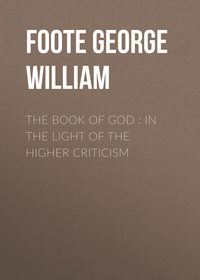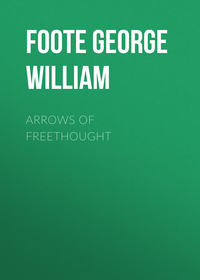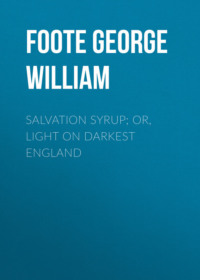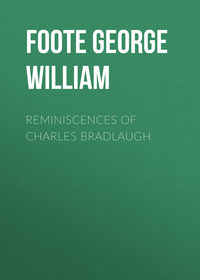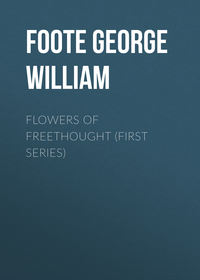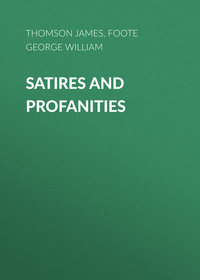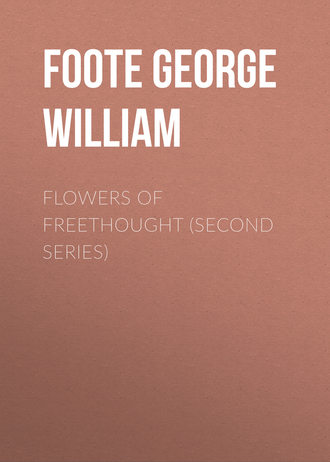 полная версия
полная версияFlowers of Freethought (Second Series)
Now all these senses are perfectly natural. Every one of them is found in the lower animals as well as in man. How then can there be anything supernatural, supersensible, or "spiritual,", in their combination? Is it not evident that Religion works, like everything else, upon common materials? Chiefly, indeed, upon the unchastened imagination of credulous ignorance. We may prove this from Mr. Le Gallienne's own testimony.
"Are there not impressions borne in upon the soul of man as he stands a spectator of the universe which religion alone attempts to formulate? Certain impressions are expressed by the sciences and the arts. 'How wonderful!' – exclaims man, and that is the dawn of science; 'How beautiful!' – and that is the dawn of art. But there is a still higher, a more solemn, impression borne in upon him, and, falling upon his knees, he cries, 'How holy!' That is the dawn of religion."
Mr. Le Gallienne does not see that this is all imagination. "The heavens declare the glory of God," exclaims the Psalmist. On the other hand, a great French Atheist exclaimed, "The heavens declare the glory of Copernicus, Kepler, and Newton."
Mr. Le Gallienne does not see, either, that man did not exclaim, "How holy!" when he first fell upon his knees. His feeling was rather, "How terrible!" The sense of holiness is a social product – a high sublimation of morality. Man had to possess it himself, and see it highly exemplified in picked specimens of his kind, before he bestowed it upon his gods. Deities do not anticipate, they follow, the course of human evolution.
Mr. Le Gallienne is an Optimist. He is young and prosperous, and, judging from his poetry, happily married. He is therefore satisfied that all is for the best – if properly understood; just as when an alderman has dined, all the world is happy.
There are such people, however, as Pessimists, and Mr. Le Gallienne hates them. Schopenhauer, for instance, he rails at as a "small philosopher." whose ideas were only the "formulation of his own special disease, the expression of his own ineffably petty and uncomfortable disposition." At which one can only stare, as at a mannikin attacking a colossus. Spinoza too can be treated jauntily if he does not fall into line with Mr. Le Gallienne. George Meredith is treated with abundant respect, but he is wronged by being enrolled as a facile optimist, and "the strongest of the apostles of faith." He is certainly nothing of the kind, in Mr. Le Gallienne's sense of the words. He has faith in reason and humanity, but this is a very different thing from faith in the idols – even the greatest idol – of the Pantheon.
"There is too much pain in the world," said Charles Darwin, who knew what he was talking about, and always expressed himself with moderation. In the moral world, pain becomes evil; and the problem of evil has ever been the crux of Theism. It cannot be solved on Theistic grounds, and accordingly it has to be explained away. Pain, we are told, is the great agent in our development; in the ethical sphere, it is the "purifying fire," which purges the gold in us from its dross. All of which sounds very pretty in a lecture, and looks very pretty in a book; but is apt to excite disgust when a man is suffering from incurable cancer, or utter destitution in the midst of plenty; or when a mother stands over the corpse of her child, mangled in some terrible accident, or burnt to a cinder in a fatal fire.
Certainly, pain subserves a partial purpose. It is sometimes a warning, though the warning is often too late. But its function is immensely overrated by Mr. Le Gallienne and other religionists. It is all very well to talk about the "crucible," but half the people who go into it are reduced to ashes. Mr. Le Gallienne will not accept Spinoza's view that "pain is an unmistakable evil; joy the vitalising, fructifying power." But the great mystic, William Blake, said the same thing in, "Joys impregnate, sorrows bring forth." George Meredith has expressed the same view in saying that "Adversity tests, it does not nourish us." Even the struggle for existence does not add any strength to the survivors. It sometimes cripples them. By eliminating the unfit – that is, the weak – it raises the average capacity. But what a method for Infinite Wisdom and Infinite Goodness! There was more sense, and less cruelty, in the ancient method of infanticide.
Mr. Le Gallienne seems to feel that his theory of pain is too fantastic, so he falls back on "mystery." "We can form no possible conception," he says, "of the processes of God." Why then does he talk about them so consumedly? Ignorance is a good reason for silence, but none for garrulity.
We must be "humble," says Mr. Le Gallienne, and recognise that we only exist "to the praise and glory of God." We are his servants and soldiers, and the pay is life! – "Had he willed it, this glorious gift had never been ours. We might have still slept on unsentient, unorganised, in the trodden dust." Very likely; but who could lose what he never possessed? It is a small misfortune that can never be realised.
Mr. Le Gallienne leaps the final difficulty by exclaiming that "Man has no rights in regard to God." He shakes hands with St. Paul, who asserts the potter's power over the clay. Yes, but man is not clay. He lives and feels. He has rights, even against God. The parent is responsible for his child, the creator for his creature. The opposite doctrine is fit for cowards and slaves. It comes down to us from the old days, when fathers had the power of life and death over their children; it dies out as we learn that the first claim is the child's, and the first duty the parent's.
Mr. Le Gallienne's god is the old celestial despot of theology in a new costume. On the question of a future life, however, we are pleased to find a vein of heterodoxy and common sense. Mr. Le Gallienne asks, with respect to the "hereafter," whether we "really care about it so much as we imagine." We talk about meeting our old friends in heaven, for instance, but do we not "meet them again already on earth – in the new ones"! It is said that if fine, cultivated personalities do not survive death, they are wasted, and have existed in vain. Mr. Le Gallienne's reply to this objection is clear, sufficient, and well expressed: —
"But how so? Have they not been in full operation for a lifetime? 'Tis a pity truly that the old fiddle should be broken at last; but then for how many years has it not been discoursing most excellent music? We naturally lament when an old piece of china is some sure day dashed to pieces; but then for how long a time has it been delighting and refining those, maybe long dead, who have looked upon it. – If there were no possibility of more such fiddles, more such china, their loss would be an infinitely more serious matter; but on this the sad-glad old Persian admonishes us: —
… fear not lest Existence, closing yourAccount and mine, should know the like no more;The Eternal Saki from the bowl has pour'dMillions of Bubbles like us, and shall pour.Nature ruthlessly tears up her replicas age after age, but she is slow to destroy the plates. Her lovely forms are all safely housed in her memory, and beauty and goodness sleep secure in her heart, in spite of all the arrows of death."
Without saving what they are, or which of them he considers at all convincing, Mr. Le Gallienne observes that the arguments as to a future life are "probably stronger on the side of belief" – which is rather a curious expression. But, whichever theory be true, it "does not really much matter." Very likely. But how does this fit in with the teaching of Christ? If he and his apostles did not believe in the "hereafter," what did they believe in? "Great is your reward in heaven," and similar sentences, lose all meaning without the doctrine of a future life, about which the early Christians were intensely enthusiastic. It was not in this world, as Gibbon remarks, that they wished to be happy or useful.
Mr. Le Gallienne argues that Christ taught in parables. He promised heaven, and threatened hell, but he spoke in a Pickwickian sense. However he used such phrases, it is "certain" that the evangelists "have distorted their importance out of all proportion to the rest of his teaching." By "certain" we are not to assume that Mr. Le Gallienne has access to occult sources of information. We are only to infer that he deals with the gospels arbitrarily; accepting them, or rejecting them, as they accord or disagree with his preconceptions. Indeed, this is what "essential Christianity" must always be. What each picker and chooser likes is "essential." What he does not like is unessential, if not a positive misrepresentation.
Short and easy is Mr. Le Gallienne's criterion for deciding when Christ is literal and when parabolical. "It is only Christ's moral precepts that are to be taken literally" – "all the rest is parable." What a pity it is that the Prophet of Nazareth did not give us a clear hint to this effect! The theory is one of admirable simplicity. Yet, for all that demure look of his, Mr. Le Gallienne is not so admirably simple as to work it out in practice. Accepting the moral precepts of Christ literally, a Christian should hate his father and mother, take no thought tor the morrow, live in poverty to obtain the kingdom of heaven, and turn his left cheek to everyone who takes the liberty of striking him on the right. Mr. Le Gallienne does not ask us to do these things; he does not say he performs them himself, He would probably say, if pressed, that allowance should be made for oriental ways of speaking. But, in that case, what becomes of the "literal" method of reading the "moral precepts" of Christ?
Mr. Le Gallienne, who despises "thinkers," is all at sea in his chapter on Essential Christianity. He does not know his own mind. He declares that Christ "combined" in his own person and teaching "the intense spirituality of the Hebrew, the impassioned self-annihilation of the Hindoo, the joyous naturalism of the Greek." Yet he also remarks that there is something beautiful in "such presences as Pan, Aphrodite, and Apollo," which we do not find in Christianity; though he is careful to add that there is not "actually any strife between them and the sadder figure of the Galilean." "All the gods of all the creeds," he says, "supplement or corroborate each other." Perhaps so; but what becomes of that "masterful synthesis," in which Christ gathered up the "joyous naturalism of the Greek," no less than other ancient characteristics? It is well to have a good memory (at least) when you are setting the world to rights.
Christianity has been historically a failure. Mr. Le Gallienne more than admits the fact; he emphasises it, and tries to explain it. In the first place, he says the priests have been too many for Christ; they got hold of Christianity, and turned it into the channel of their interests. In the next place, the world was not ready for "essential" Christianity; an argument in flat contradiction to the doctrine of "preparation," which has placed so important a part in Christian apologetics ever since the time of Eusebius. In the third place, "essential" Christianity is an idealism, and "a throng of idealists is an impossibility." The horde of earthly-minded people have simply trodden upon the precious pearls of Christ's teaching. It is not true that the world has tried the Gospel of Christ and found it wanting; the world has never tried it at all, and "in this nineteenth century of the so-called Christian era, it has yet to begin."
Supposing all this to be true, what does it prove? On the theory that Christ was God, or sent by God, it proves either that Providence interfered too soon, or that it is incapable of making any real impression upon the stubborn inhabitants of this planet; either alternative being a reflection on the wisdom or the power of the deity. On the theory that Christ was only a man, it proves that he taught an impossible gospel. After all these centuries it is still contested and still to be explained. Would it not, after all, be better to put aside this source of confusion and quarreling, and to rely upon reason and the common sentiments of humanity? Mr. Le Gallienne admits that in some respects "such a book as Whitman's Leaves of Grass is more helpful than The New Testament– for it includes more." Why then all this chatter about Christ? Can we ever be united on a question of personality? Is it not absurd, and worse than absurd, to thrust this object of contention into the arena where the forces of light should be fighting, like one man, the strong and disciplined forces of darkness?
All this talk about "the sublime figure of Christ" is a reminiscence of his faded deity. We do not indulge in heated discussions as to the personality of any other man. We speak of other "sublime" figures, but the expression is one of individual reverence. We do not say that those who do not share our opinion of Buddha, Socrates, Mohammed, Bruno, Cromwell, Danton, or even Plato or Shakespeare, are grovelling materialists and candidates for perdition. No, the chatter about Christ is only explicable on the ground that he was, and still is by millions, worshipped as a god. The glamor of the deity lingers round the form of the man.
It is impossible for persons of any logical trenchancy to remain in this stage. Francis Newman gave up orthodox Christianity, and also the equivocations of Unitarianism, but he clung to "the moral perfection of Christ." In the course of time, however, the scales fell from his eyes. He had been blinded by a false sentiment. Letting his mind play freely upon the "sublime figure" of the Prophet of Nazareth, he at length perceived that it had its defects. No mortal is endowed with perfection. Such monsters do not exist. Indeed, the teaching of Christ is as defective as his personality, Its perfection and sufficiency can only be maintained by those who never mean to incur the perils of reducing it to practice. Who really tries to carry out the Christianity of Christ? Only one man in Europe that we know of, and his name is Count Tolstoi; but he is saved from the worst consequences of his "idealism" by the more practical wisdom of his wife, who will not see him, any more than herself and her children, reduced to godly beggary.
Mr. Le Gallienne seems to us to belong to the sentimentalists, though we hope he will grow out of their category. He appears to dread accurate thinking, and to imagine that knowledge destroys the charm of nature. "Which," he asks, "comes nearest to the truth about love – poor Lombroso's talk about pistil and stamen, or one of Shakespeare's sonnets?" The root, he says, is no explanation of the flower.
This may be fine, but it is fine nonsense. Lombroso and Shakespeare are both right. The physician does not contradict the poet. And if the root is no explanation of the flower, what will happen if you are careless about the root and the soil in which it is planted? Does a gardener act in that way? Is it not the horticulture of Fleet-street sentimentalists?
Mr. Le Gallienne is great on what he calls the "root" fallacy. Wishing to keep the "irreligious instinct" in mystery, or at least obscurity, he objects to anthropological "explanations." He cannot tolerate talk about ancestor-worship, and other such "rude beginnings of religion," although it comes from the lips of his intellectual superiors, such as Tylor, Lubbock, and Spencer. Even if they are right, he falls back upon his old exclamation, "What does it matter?" If the flower began as a root, he says, that is no argument against "the reality of the flower." But this is a shifting of ground. The reality of the flower, the reality of the "religious instinct," is not in dispute. The question is, What is its explanation? No one denies that man idealises and reveres. The question is, How did he come to let these faculties play upon ghosts and gods? And the explanation is to be found in his past. It cannot possibly be found in his present, unless we take him as a savage, in which case he is an embodiment of the past of our own ancestors, from whom we derive every vestige of what we call our "religion."
Man's nature, like his destiny, is involved in his origin. However he may be developed, he will never be more than "the paragon of animals." And it is the recognition of this unchangeable truth which makes all the difference between the evolutionist, who labors for rational progress, and the sentimentalist, who fritters away his energies in cherishing the delusions of faith.
1
November 21, 1886.
2
Mr. Hughes talks so much that he must have little time for reading. Every educated man, however, is supposed to be acquainted with Bacon's Essays, the thirteenth of which opens as follows: – "I take goodness in this sense, the affecting of the weal of men, which is that the Grecians called Philanthropia; and the word humanity (as it is used) is a little too light to express it." Bacon not only knew the antiquity of Philanthropia, but preferred it to the later and less weighty term so ignorantly celebrated by Mr. Hughes.
3
The Influence of Scepticism on Character. Being the sixteenth Fernley Lecture. By the Rev. William L. Watkinson. London: T. Woolmer.
4
April 26,1891.
5
Christianity and Slavery. No. 18 of Oxford House Papers. By H. Henley Henson, B.A., Head of the Oxford House in Bethnal Green. London: Rivingtons.
6
June 11, 1893.
7
Professor Mivart is a man to be pitied. First of all, his views on Hell were opposed by Father Clarke, against whom the hell-reformer defended himself. Last of all, however, Professor Mivart's articles on this subject were placed upon the Index of Prohibited Books, which no good Catholic is allowed to read, except by special permission. Rome had spoken, and the Professor submitted himself to Holy Mother Church. In doing so, he destroyed the value of his judgment on any question whatever, since he submits not to argument, but to authority.
8
The Development of Theology as Illustrated in English Poetry from 1780 to 1830. By Stopf ord A. Brooke.
London: Green, Essex-street.
9
Sept. 24,1893.
10
April, 1893.
11
July 22, 1888.
12
July 2, 1893.
13
December, 1888.
14
November, 1888.
15
December, 1893.
16
November 19, 1893.
17
January 13,1889.
18
March 26,1893.
19
March 19, 1893. Written after a debate at the Hall of Science, London, between the writer and the Rev. C. Fleming Williams, on "Christian Ideas of Man and Methods of Progress." Mr. Branch, of the London County Council, presided, and there was a very large attendance.
20
This gentleman was trying to prevent me from delivering Sunday lectures at Hull under the usual condition of a charge for admission.
21
March, 1889.
22
July, 1889.
23
March, 1889.
24
June, 1890.
25
January, 1894.
26
June, 1890.
27
April, 1894.


